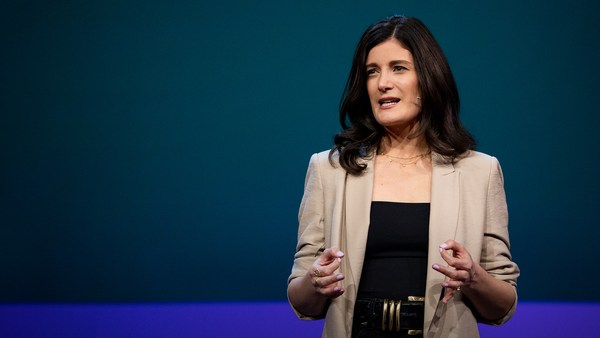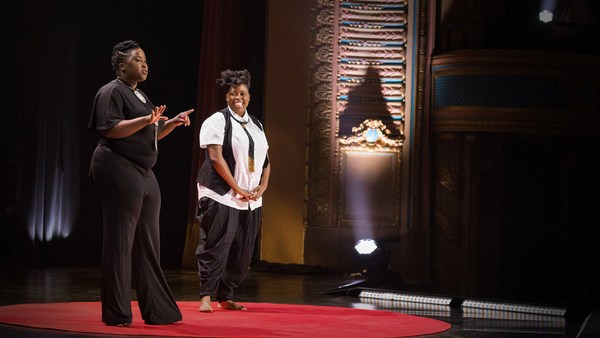Take a moment to think about your sex life. Don't worry, I'm a professional, I ask this question all the time. My guess is that most of you are thinking about solo pleasure or the interaction between you and someone else, perhaps. There's probably very few of you who are thinking about how your sex life connects to wider dynamics in society.
Let me explain by starting somewhere a little different. The gender pay gap has reduced in the last three decades in the UK, and we have more women in senior management positions than ever before. But there is also still such a long way to go. Britain only ranks 21st in the world for gender equality. And not all women benefit equally from the advances we've made so far. Today, I'm going to tell you how the orgasm gap, which is data about gender inequality from sex science, is a lesser known but powerful indicator of just how far we still have to go.
Progress towards equality in any area is about breaking free of entrenched social norms. And this is especially the case in sex. In my work, as a clinical psychologist specializing in helping people with their sex lives, I noticed that we're often unaware of how much of how we are sexually is dictated by forces outside of ourselves or outside of our sexual relationships. What we should say, how we're supposed to be, what we're supposed to look like, who does what and when, what we're supposed to be into. These scripts, they're all written for us, and we learn them from language, from peers and from the media.
I don't know about you, but I'm starting to see a small change in these scripts. These days, my social media feeds are full of posts about women's sexual empowerment and women's bodily autonomy compared to, say, five years ago. And this is great. But in my work, I notice that this change has not yet translated to real life and to the bedroom. Not that everyone has sex there, but you know what I mean.
(Laughter)
I see plenty of women in my clinic who tell me that they feel more empowered than ever to take up space, to call out misogyny, to demand a seat at the table. But when it comes to their sex lives, they can't seem to bring themselves to feel empowered in the same way. They tell me that they feel silenced, disempowered and made to feel that they are the problem. And they don't know how to tackle it.
So why is this happening? Well, we used to think that women’s orgasms were hard to come by, and that because they were "tricky," this was the obvious explanation as to why when cis men and cis women have sex together, it's more often the man who leaves feeling satisfied. This is a common myth. And it's kind of got in the way of us really noticing and questioning this imbalance of pleasure across genders. This "tricky orgasm" myth has been challenged by various pieces of sex research over the last few decades, and we now know that when people masturbate, there is no difference in the rates of orgasm or the time taken to orgasm across genders, turning this idea of women's orgasms being more complex or taking longer on its head. But this sex science, and the fact that only a minority of women can come from vaginal penetration without any clitoral stimulation, is still not that widely known, leaving many women feeling like they are the problem, that they're taking too long or needing something unusual to get there. When in fact, they're entirely normal. Feeling abnormal leads them to fake it, and faking it gives their partner the wrong idea of what women's bodies need. Meaning the next woman who tries to assert what she wants or needs with that partner is seen as difficult or labeled as “hard work.” As a result, research tells us that men consistently overestimate how often women orgasm during partnered sex. And underestimate how often women are faking it. This is the reason why some women describe partnered sex as like "listening to your favorite song, but having the radio switched off before it gets to the best bit."
(Laughter)
But why does it matter? Well, the first thing to say is that orgasms are not the be-all and end-all of good sex and we must not treat them as if they are. Good sex can bring connection, stress relief, affirmation, intimacy and fun. And orgasms are just another reward like these, that serve to make us feel good and keep humans coming back for more. But what if the pleasure of one group of people is consistently privileged over the pleasure of another? What does that tell us about our society?
I mentioned earlier that people of all genders can orgasm at a similar rate when they're alone. And that rate is about 95 percent of the time. The orgasm gap refers to data from sex science, which tells us how our chances of orgasming can move from this 95 percent when we have sex with another person. The biggest gap we see is for women having sex with men. When their chances of orgasming drop from this 95 percent they might expect alone to around 65 percent with a regular partner. We see an even bigger gap emerging with casual or hookup sex between women and men, when women's chance of orgasming drops further still. Crucially, men's rate of orgasming when having sex with women stays at around 85 to 95 percent, whether that's a regular partner, casual sex and just as reliably as when they're on their own. We don't see such a dramatic orgasm gap when LGBTQ+ people have sex with each other. So, for example, women having sex with women can expect an orgasm rate only slightly less than when they're on their own.
This data is important because it tells us that it's gender which is responsible for inequality in the experience of orgasms. Not anatomy, not capacity for pleasure, but rather whose pleasure is prioritized as most important. As a society, we still aren't signed up to an idea that women's sexual pleasure is as important as men's. We're happy to strive for it, but only if the route to achieving it doesn't jeopardize men's pleasure in the process.
Now there is a complex mix of factors which maintains the orgasm gap. Firstly, not knowing what's normal. And feeling as if it's your body which is wrong. Falling for this old idea that your orgasms are somehow tricky, even though you know that they're not when you're alone. Secondly, women being socialized to put other people's needs first and being polite so as to not hurt someone else's feelings or ego. And lastly, the simple fact that the patriarchy shows itself in the way men and women have sex together. The sheer physicality of a sexual script which favors penis and vagina sex above all else as "real sex," simply suits men's anatomy more. This is one of the reasons we don't see such a dramatic orgasm gap when women have sex with other women, and we can learn from this. Ditch the script and have more sex which looks like the sex you enjoy alone.
So, what are we to do? Stop faking it. Yes, I know you've all done it. And you're so, so good at it.
(Laughter)
I know it comes from a place of not feeling normal or wanting to communicate something or trying to protect someone else's feelings. But all faking does is strengthen this patriarchal script and means your needs are less likely to be met over time. We can also notice how inequality shows up in the bedroom. Is it OK with you that your needs are sidelined in favor of someone else’s? How does that fit with your values around equality and other areas of your life? It’s OK to be motivated by something other than orgasms when you have sex. But this should be your choice to make, not some kind of sexual glass ceiling based on gender.
And lastly, by showing up for each other. If more women felt able to be upfront about their pleasure and what their body needs, this would pave the way for women collectively to benefit. It would mean the next woman who tries to be open about what her body needs would be less likely to be dismissed as complex or unusual. It would change the story. It would redress the balance.
But this journey isn't just for women to take. Men can show up here also, by believing women when they say what they need. These women are not the outliers you think they are. They are the voice of change. Men can also show up by understanding that women's capacity for pleasure is equal to their own and by genuinely championing sex which has mutual pleasure at its core, even if that means sacrificing their own, more comfortable position of privilege from time to time.
So, let's start a revolution. After all, who knows what the impact of gender equality behind closed doors might have on the rest of society.
Thank you.
(Applause and cheers)





